
I love science, and for sure I love science fiction. Why? The author usually builds his imagination on top of the existing science, which also includes some hopes and criticisms of how humans will use scientific advances for bad choices. And it is crazy when we go back to some of the interesting classics released years ago, and some of the author's speculations happened. One good example is the book "1984" which despite the year of the title, was released in 1949. It brings a technological society where the entity "Big Brother" could control everyone's life using technology as a tool. We see nowadays the possibility of maybe not one "Big Brother" but governments using technological resources to follow their citizenships. Canada's intelligence just released a warning about TikTok being a Chinese government tool to spy on people today.

One interesting movie that I have always liked to show to my students was "GATTACA". It is an impressive movie from 1997. The movie was released a bit before the release of the first human genome draft (in 2001) and it brought a big concern from the author: bioethics around the genetic knowledge exploration in humans. The initial premise of the movie is a regular couple having a first child, in a natural way for a technological era where you could get instant genes mapping and check genetic variations.
Right after the kid was born, they mapped all the probabilities of this child having a genetic disease in the future. This kid had higher probabilities for that and gave him his life expectation around his 30s. For the second child, the couple decided to control better and using geneticists they could select which fertilized eggs were "better" genetically. A "perfect person" would be born.
The movie goes with the "imperfect child" trying to fulfill his dream of space travel, which was discriminated against because he had "imperfect genes". So he used all the ways to try to make this possible. The lesson of the movie was about the dangers of genetic manipulation in humans to create a perfect human. The German government thought about this during World War II with less knowledge about genetics technologies. But it is the same principle. Those who can afford the genetics manipulations were susceptible to being tagged as "imperfects". Nowadays we can get our genes mapped, and finding some genetic variations that are associated with a disease, doesn't mean that we are going to have this disease. Our genetic code is something to be analyzed carefully and not like a computer, since our biology doesn't behave like a computer.
The lessons that the author of this movie wanted to show may be ignored by many people. When that Chinese researcher published that he modified embryos genetically that created resistance to HIV infection, it reminded me how GATTACA's author could imagine something that could be possible in the future.

For sure it is a lesson learned that brought me to my life nowadays in my practice. I tried somehow to pass this information to students who probably would never hear about this old movie. Movies usually are made to be fun and make us forget about our lives, but they can always bring good lessons to think about it. Science fiction movies and shows are wonderful to imagine worlds with life that we haven't met yet, or how is to travel through a black hole. But still, all of these dreams are based on reality.


Eu amo ciência, e com certeza amo ficção científica. Por quê? O autor geralmente constrói sua imaginação com base na ciência existente, o que também inclui algumas esperanças e críticas sobre como os humanos usarão os avanços científicos para más escolhas. E é louco quando voltamos a alguns dos clássicos interessantes lançados anos atrás, e algumas das especulações do autor aconteceram. Um bom exemplo é o livro "1984" que, apesar do ano do título, foi lançado em 1949. Ele traz uma sociedade tecnológica onde a entidade "Big Brother" poderia controlar a vida de todos usando a tecnologia como ferramenta. Hoje em dia vemos a possibilidade de talvez não um "Big Brother", mas governos usando recursos tecnológicos para seguir seus cidadãos. A inteligência do Canadá acabou de lançar um aviso sobre o TikTok ser uma ferramenta do governo chinês para espionar as pessoas hoje.

Um filme interessante que sempre gostei de mostrar aos meus alunos foi "GATTACA". É um filme impressionante de 1997. O filme foi lançado um pouco antes da divulgação do primeiro rascunho do genoma humano (em 2001) e trouxe uma grande preocupação do autor: a bioética em torno da exploração do conhecimento genético em humanos. A premissa inicial do filme é um casal regular tendo um primeiro filho, de forma natural para uma era tecnológica onde você poderia obter mapeamento genético instantâneo e verificar variações genéticas.
Logo após o nascimento da criança, eles mapearam todas as probabilidades de essa criança ter uma doença genética no futuro. Esta criança tinha maiores probabilidades disso e sua expectativa de vida foi estimada em torno dos 30 anos. Para o segundo filho, o casal decidiu controlar melhor e, usando geneticistas, eles puderam selecionar quais ovos fertilizados eram geneticamente "melhores". Uma "pessoa perfeita" nasceria.
O filme segue a história da "criança imperfeita" tentando realizar seu sonho de viajar para o espaço, o que foi discriminado porque ele tinha "genes imperfeitos". Então ele usou todos os meios para tentar tornar isso possível. A lição do filme era sobre os perigos da manipulação genética em humanos para criar um ser humano perfeito. O governo alemão pensou nisso durante a Segunda Guerra Mundial com menos conhecimento sobre tecnologias genéticas. Mas é o mesmo princípio. Aqueles que podem pagar pela manipulação genética seriam suscetíveis de serem rotulados como "imperfeitos". Hoje em dia podemos mapear nossos genes, e encontrar algumas variações genéticas associadas a uma doença não significa que vamos ter essa doença. Nosso código genético é algo a ser analisado cuidadosamente e não como um computador, já que nossa biologia não se comporta como um computador.
As lições que o autor deste filme queria mostrar podem ser ignoradas por muitas pessoas. Quando aquele pesquisador chinês publicou que modificou embriões geneticamente para criar resistência à infecção por HIV, isso me lembrou como o autor de GATTACA pôde imaginar algo que poderia ser possível no futuro.

Com certeza é uma lição aprendida que trouxe para minha vida nos dias de hoje na minha prática. Tentei de alguma forma passar essa informação para os alunos que provavelmente nunca ouviriam falar deste filme antigo. Filmes geralmente são feitos para ser divertidos e nos fazer esquecer de nossas vidas, mas eles sempre podem trazer boas lições para refletir. Filmes e séries de ficção científica são maravilhosos para imaginar mundos com vida que ainda não conhecemos, ou como é viajar por um buraco negro. Mas ainda assim, todos esses sonhos são baseados na realidade.

Posted Using InLeo Alpha


